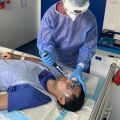Oxford Vaccine Group, Department of Paediatrics, University of Oxford receives £7.8 million in research funding to fight pandemic and epidemic threats
12 December 2023
Oxford Vaccine Group (OVG), which led the rapid clinical development of the Oxford vaccine in COVID-19 in the pandemic, has been awarded a total of £7,788,783 by UK Aid for research into the prevention of five dangerous diseases with epidemic or pandemic potential. The awards will fund research into vaccines against:
- Chikungunya and mayaro virus
- Marburg virus
- Plague (Yersinia pestis)
- Q Fever (Coxiella burneti)
- Sudan Ebolavirus
The Department of Health and Social Care (DHSC), as part of UK Vaccine Network (UKVN), has made these financial awards to a UK Aid programme, to develop vaccines for diseases with epidemic potential in low and middle-income countries (LMICs).
The development of safe and efficacious vaccination against diseases that cause substantial morbidity and mortality has been one of the foremost scientific advances of the 21st century and OVG, is one of the world’s leading academic vaccine research teams. Its current research includes the study of vaccines for outbreak pathogens and pandemics and, in collaboration with Oxford’s Pandemic Sciences Institute, it draws upon experience and lessons learnt from COVID-19 pandemic to identify and prepare for future pandemic threats.
Professor Sir Andrew Pollard, Director of OVG and the Ashall Professor of Infection and Immunity at the Pandemic Sciences Institute, said: “The recent pandemic has highlighted the importance of making vaccines against potential threats to humanity and it is in that context that we are delighted to receive this new funding to drive our vital research into vaccines to protect communities against Marburg virus, Sudan Ebolavirus, plague, Q Fever and chikungunya and mayaro virus. This critical work will help prevent future outbreaks in low- and middle-income countries and offer protection against future pandemics, as previously realised with the Oxford/AstraZeneca vaccine for COVID-19.”
Professor Teresa Lambe, Calleva Head of Vaccine Immunology at the Department of Paediatrics, and a Professor of Vaccinology and Immunology at OVG and the Pandemic Sciences Institute, said: “These awards are another important milestone in pandemic prevention. This funding will not only support our efforts to develop life-saving protection for people in low and middle-income countries, but will ensure the UK can respond quickly to potential future pandemic threats.”
Dr Young Chan Kim, a Sir Henry Wellcome Fellow and Principal Investigator at OVG who will be leading the Plague, Q-fever, and Alphaviruses programmes under the direction of Professor Pollard said: “We are thrilled to receive these awards to develop new vaccines against these pathogens. This funding will allow us to accelerate our efforts in developing affordable and accessible vaccines that are well-suited for outbreak prevention and general immunisation in low-and-middle-income countries.”
The UKVN programme is funded through UK Official Development Assistance (ODA) via the DHSC. Awards under this programme have been made through competitions run in partnership with BBSRC, EPSRC, Innovate UK and NIHR.
Further information:
Marburg virus disease (MVD) is considered one of the deadliest infectious diseases causing viral haemorrhagic fever (VHF) in humans. Currently, there are no vaccines or specific treatments for MVD. Between 1967 and 2021 there have been fourteen recorded outbreaks, primarily occurring in Uganda.
Ebola viruses also cause viral haemorrhagic fever (VHF) in humans with devastating impact on populations and high fatality rates. In September 2022, there was an outbreak of Sudan Ebolavirus (SUDV) in Uganda with 164 cases and 77 deaths. The disease was controlled through case quarantining and contact tracing however, this approach is not always immediately effective as evidenced by the 2013-2016 ebolavirus (Zaire ebolavirus /EBOV) outbreak, which claimed in excess of 11,000 lives.
Plague caused by the bacterium Yersinia pestis, is a deadly disease with sporadic cases worldwide and recent outbreaks reported in Africa, China, Russia, and the US, and especially in Democratic Republic of Congo (DRC) and Madagascar. The largest known plague pandemic occurred in the 14th Century and was known as the Great Pestilence (later called the Black Death). It killed half the population of Europe. Antibiotic resistant strains of plague have been described and add to the difficulties in managing outbreaks in resource-limited settings. OVG’s previous work on plague has provided very promising data that will be used to accelerate progress in this programme to provide a new vaccine against this ancient threat.
Q fever is caused by the bacterium Coxiella burnetii. It is highly contagious and currently classified as a potential outbreak pathogen/bioterrorism agent. Q fever cases were extensively reported in LMICs, and the global distribution of Q fever and its burden on regional health security requires safe, efficacious, and affordable vaccines to address. In this programme a new Q fever vaccine candidate will be developed and preparations undertaking for high quality manufacturing and clinical trials.
Chikungunya (CHIKV) and mayaro virus (MAYV): the aim of this project is to develop a bivalent vaccine against two major arthritogenic mosquito-borne viruses. CHIKV and MAYV have spread through Latin America putting the population of over 650 million people at risk of contracting them. The work under this award will aim to develop a bivalent Chikungunya-Mayaro (Chik-May) vaccine using viral-vector and mRNA technologies and to identify the optimal vaccine candidates for a clinical trial.
Notes to editors:
Media queries please contact the University of Oxford press office at [email protected] or Dr. Adriaan Louis Taljaard, Manager Strategic Communications (Vaccines) on [email protected]
About the University of Oxford
Oxford University has been placed number 1 in the Times Higher Education World University Rankings for the eighth year running, and number 3 in the QS World Rankings 2024. At the heart of this success are the twin-pillars of our ground-breaking research and innovation and our distinctive educational offer.
Oxford is world-famous for research and teaching excellence and home to some of the most talented people from across the globe. Our work helps the lives of millions, solving real-world problems through a huge network of partnerships and collaborations. The breadth and interdisciplinary nature of our research alongside our personalised approach to teaching sparks imaginative and inventive insights and solutions.
Through its research commercialisation arm, Oxford University Innovation, Oxford is the highest university patent filer in the UK and is ranked first in the UK for university spinouts, having created more than 300 new companies since 1988. Over a third of these companies have been created in the last five years. The university is a catalyst for prosperity in Oxfordshire and the United Kingdom, contributing £15.7 billion to the UK economy in 2018/19, and supports more than 28,000 full time jobs.
About the Oxford Vaccine Group (Department of Paediatrics, Medical Science Division, Oxford University)
The Oxford Vaccine Group is part of the Department of Paediatrics at the University of Oxford. It led the rapid clinical development of vaccinations against COVID-19 in the pandemic and has made significant contributions to knowledge, supporting national and global policy on immunisation over 3 decades.
OVG was founded in 1994 by Professor E. Richard Moxon. It is one of the world’s leading academic vaccine research teams, and has been led by Professor Sir Andrew Pollard since 2001. The OVG undertakes vaccine research spanning basic science and preclinical studies through to epidemiological studies, human challenge models and phase I-III clinical trials. Current research includes the study of vaccines for outbreak pathogens and pandemics, enteric pathogens, bacterial and viral respiratory infections, and use of human challenge models to accelerate vaccine development.
About the UK Vaccine Network:
The Department for Health and Social Care (DHSC) is the UK Government department which is responsible for helping people to live more independent, healthier lives for longer. This investment is part of the UK Vaccine Network (UKVN). UKVN was established to provide funding to support the development of promising vaccines and vaccine technologies that will help combat infectious diseases that have epidemic potential in low and middle-income countries (LMICs). UKVN is an UK Aid investment, which means all projects funded must support research primarily and directly for the benefit of people in low- and middle-income countries (LMICs).
About the Department of Paediatrics
The Department of Paediatrics is a world leader in child health research and hosts internationally renowned programmes in drug development, gastroenterology, haematology, HIV, immunology, neuroimaging, neuromuscular diseases and vaccinology. Its work spans from early proof-of-concept and fundamental science all the way up to its application in clinical settings.
The Department aims to shape the landscape of medical science by positively impacting the lives of millions of children through its global research programmes, academic resources and commitment to success. With research facilities in the UK and abroad, the Department of Paediatrics works on an international scale, and has a strong, collaborative network with the medical science community across the globe.
About the Pandemic Sciences Institute
The Pandemic Sciences Institute at the University of Oxford is a research institute with a mission to discover, create and enable practical solutions to infectious disease threats worldwide. The Institute is hosted by the University’s Nuffield Department of Medicine. Visit our website and Follow us on X (formerly Twitter).
 Ground-breaking study reveals how COVID-19 vaccines prevent severe disease
Ground-breaking study reveals how COVID-19 vaccines prevent severe disease
 Novel triple drug combination effective against antibiotic-resistant bacteria
Novel triple drug combination effective against antibiotic-resistant bacteria
 Researchers discover how immune cells hunt down cancer around the body
Researchers discover how immune cells hunt down cancer around the body
 New algorithm supercharges climate models and could lead to better predictions of future climate change
New algorithm supercharges climate models and could lead to better predictions of future climate change
 New study to improve vaccines and therapeutics development
New study to improve vaccines and therapeutics development